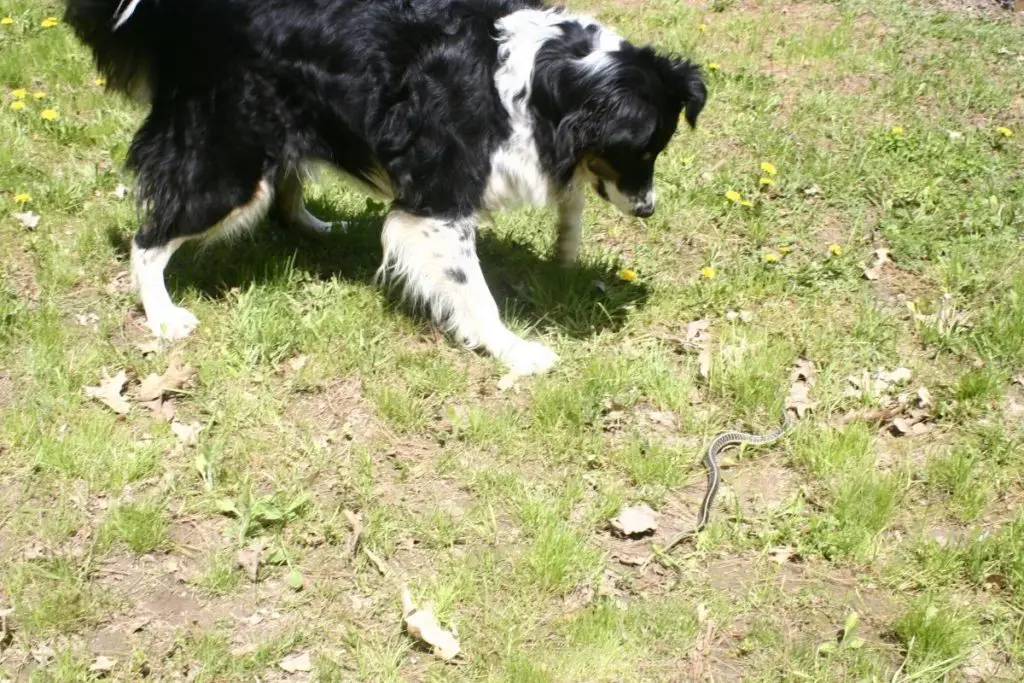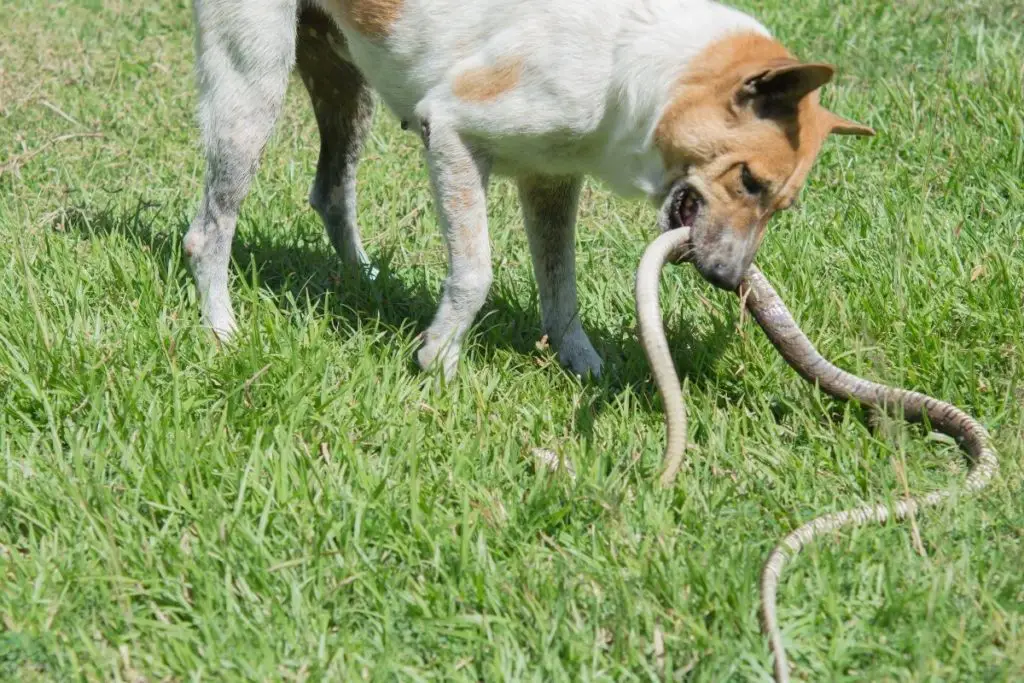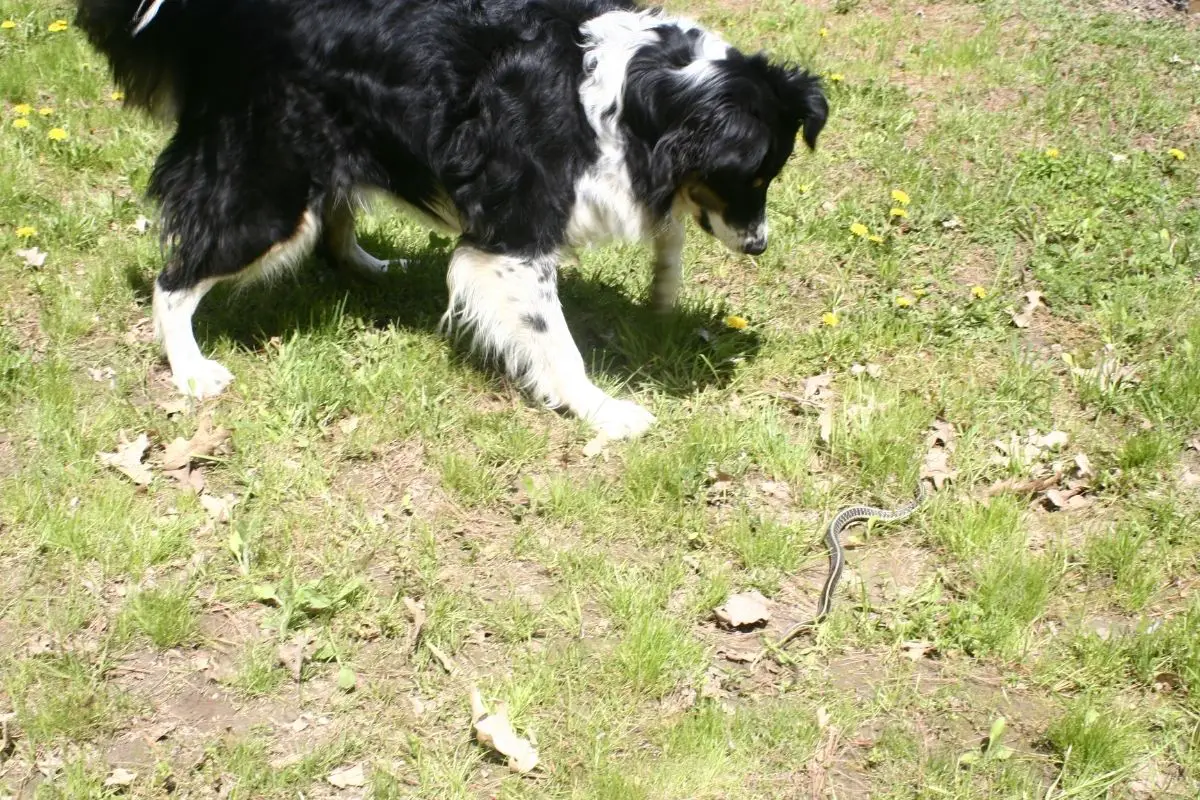Dogs are known for their curiosity. They love to explore and investigate anything that piques their interest. This allows them to explore the world and also be aware of anything that may threaten them or their family, a very useful trait in an animal that has been used for thousands of years to protect livestock, humans, and their houses.
However, this trait can also get them into trouble, for example, a venomous snake is not a thing you want to approach and investigate. So, while humans are instinctively afraid of snakes, what about dogs? Do they also have the instinct to stay away from them?
Are Dogs Afraid of Snakes? Dogs are not afraid of snakes. While humans, even as babies, instinctively feel threatened by snakes, dogs do not fear snakes at all, and when a dog sees a snake, they are more likely to try to approach and investigate to determine if it’s a threat and will attack the snake if they feel it threatens them.
So while humans can instinctively know that a snake is not something you should approach, man’s best friend simply doesn’t have this innate fear, which can be a bless and a problem at the same time.
To understand how your dog sees snakes and what you need to do to keep your dog safe, keep reading.
Contents
Why Dogs Don’t Fear Snakes

In a study published in Applied Animal Behaviour, Science magazine scientists confirmed that dogs appeared to be fearless of poisonous snakes that may terrify humans and other primates.
We know that we, humans, have an instinctive fear of Snakes. Researchers believe that we, along with all other primates, have developed this fear to protect ourselves instinctively from venomous snakes and spiders.
Even 6-month-old infants were startled by images of snakes and spiders, compared to flowers and fish, according to a 2017 study, further proving that snakes are innate threats.
Snakes are more interesting rather than threatening to dogs
Dog owners claim that their pet is fearless of poisonous snakes, and in fact will approach them to investigate. This has been verified by limited research on the topic.
A study of dogs with envenomations found that 83% of them had been struck in the face and neck area, meaning that dogs do approach snakes head-first and not warily as a fearful animal would.
Your Dog is at risk of being bitten by snakes

Because dogs don’t fear snakes but snakes do fear dogs, snakes are likely to attack dogs, so your dog is always at risk of being bitten by a snake.
Some dogs have been bred to hunt and kill snakes, and these are the ones you should consider when getting a dog in a snake-infested area. You can learn more about the dog breeds that can kill snakes here.
The severity of a snake bite is determined by a variety of things, including the age and species of snake, the amount of venom released, and where on your pet’s body it occurs.
What to do if a snake bites your dog?

First things first: Don’t panic. Panicking or stressing will only make things worse. Do Not try to apply heat or ice. Do not try to suck the venom out, cut into the bite, or give your dog medication on the way to the vet.
The risk with snakes is not only that they may bite your dog – and they will – but also that your dog may try to eat the snake. That means that prevention through training is something you should definitely consider when you first get your dog and know that you live in a place when an encounter with a snake is a possibility.
How to prevent your dog from being bitten by a snake
If you and your dog go hiking or camping on a regular basis, you might want to consider the following popular best practices:
- Avoidance Training: Use avoidance training to teach your dog that when they see a snake, they should move away instead of investigate.
- Rattlesnake Vaccines: Giving your dog vaccines adds a layer of protection, but it doesn’t mean that your dog is safe from snakes completely. If a snake bites your dog or your dog eats a snake, they still need urgent medical attention.
For more tips on how to prevent snakes from getting to your dog or your house, make sure to check out this article on how to protect your dogs, house, and family from snakes.
How does a snake vaccine work?
It works by stimulating your dog’s immune system to generate antibodies to snake venom, which helps to neutralize some of the harm and speed up healing.
It’s most effective against Western and Western Diamondback Rattlesnakes, although it provides varying protection against other snakes. It doesn’t protect you from Mojave rattlers, Coral snakes, or Cottonmouths since evidence isn’t available to prove its efficacy.
Keep in mind that its protection will only last for a year, and that vaccines should be administered during the peak snake season. It’s critical to work out an individualized regimen with your veterinarian!
Safety Tips to protect your dog against Snakes
- Keep an eye out for snakes at all times.
- Keep your dog on a leash, don’t allow them to investigate snakes
- Do not allow your dog to investigate under leaves, logs, or other tight spaces, especially if you know the area has snakes, and most areas do. Snakes are resilient and are everywhere.
- Educate yourself. Know what kind of venomous snakes are in your area and how to recognize them.
Conclusion:
While snakes may be a threat, you should be fine if you keep an eye on your surroundings, keep your dog on a leash, and know what to do in case of an emergency.
Snakes are a part of our ecosystem, they are very useful in protecting our cities from rats infestations and other rodents that can spread diseases, and they really don’t deserve the bad rep they have been getting lately.
With that being said, you and your dog should always keep a safe distance from snakes. Stay Safe!
Helpful Resources
The nose may not know: Dogs’ reactions to rattlesnake odours
How to treat a snake bite in dogs
If you like this article, please share it!


